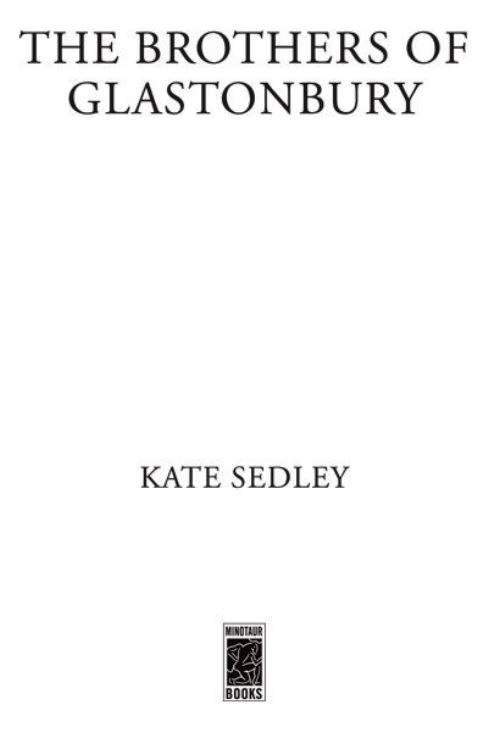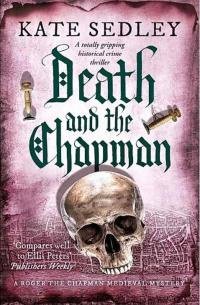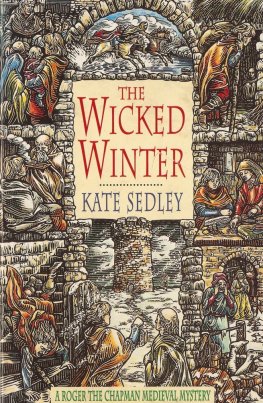Kate Sedley
THE BROTHERS OF GLASTONBURY
1997

It had been a good summer, with protracted spells of fine weather interspersing the colder, cloudier days of wind and rain. I had peddled my wares along the south coast of England as far as the town of Chichester before finally turning my feet towards home, making my way first to Winchester and then across the great wilderness north of Old Sarum, where Id found a warm welcome in the isolated hamlets and villages that fringe that great and barren waste. By the time I was within two days travelling distance of Bristol I was able to look back with ever deepening pleasure on the sights and sounds of those recent months.
I recalled warm nights, sleeping in the open under the stars, or sheltering with fellow wayfarers in the muffled darkness of some barn, exchanging views on the varied subjects of creation while small, nocturnal animals rustled beside us in the sweet-smelling straw, busy and unafraid. I remembered the chirruping of birds at dawn and the white mist rising knee-high across the meadows, the first bright rays of sunlight piercing it with broken shards of gold. I thought of evening shadows splashed across cottage walls and the pearled-grey shimmer of waterfalls and streams.
I had seen and wondered at the massive, rampant giant of Cerne Abbas, carved into a Dorset hillside thousands of years ago by our Celtic forebears, and marvelled at the primaeval stone circle raised on Salisbury plain. More recently I had helped, for the sheer fun of it, with harvesting in the fields, sharing the workers midday meal of bread and cheese, onions and barley beer, while the Harvest Lord kept strict watch on us to make certain that we took no more than our allotted time to eat and doze in the noonday sun. I had crossed the downs above Edington where Alfred, the greatest of our Saxon kings, had routed Guthrums army six hundred years before, making Wessex safe for ever from occupation by the Danes, and had descended what is still called the bloody mound, passing the night at the Augustinian priory nestling in its lee.
And now, at the close of yet another day spent dawdling from village to village, in that soft, glimmering hush that lies somewhere between twilight and full dusk, as I neared the castle of Farleigh Hungerford I saw it awash with light from torches flaring high on its grey stone walls.
I was surprised, for I had passed this way several times the castle being only a few miles from Bath, on the southerly heights that hem in that ancient township and on each previous occasion it had been occupied only by such servants as were necessary to maintain and run it during the absence of its lord. But today that lord was in residence, a fact attested to by the press of people around the eastern gate and thronging the outer courtyard, as well as the pennants and surcoats of the men-at-arms, all sporting the Black Bull passant of the Duke of Clarence.
I knew a little of the castles history for I had grown up in Wells, less than twenty miles distance as the crow flies (and where gossip from within a far greater radius reaches our ears with astonishing speed). It had originally belonged to the Hungerford family, but their support of the late King Henry and the Lancastrian cause had deprived them of their lands. Fourteen years earlier, Farleigh had been granted by King Edward to his youngest brother, the Duke of Gloucester, when Prince Richard and I too, for that matter, for we share the same birthday was nine years old. But the Duke, since attaining manhood and marrying his cousin, the Lady Anne Neville, had chosen to live in the north, at Middleham and Sheriff Hutton. He had therefore rented out Farleigh to his older brother, the Duke of Clarence, who had large holdings in Somerset. Clarences daughter, Margaret, had been born there only a year or so previously but as I say, I had never until this time found His Grace himself within.
As I approached I could see that the gates had not yet been shut against the encroaching dark, and was wondering who might be expected at such a late hour, when the porter emerged from his room to inspect me and judge if I might be admitted or no.
All right, he grunted. You can pass. Hoping for a bed in the kitchens, I suppose.
Anywhere, friend. A stable will do me just as well.
The man snorted. Youll be lucky! In case you hadnt noticed, the Dukes in residence. So what with his horses and those of His Grace of Bath and Wells, whos expected here at any moment, an empty stallll be rarer than gold in a poor mans pocket.
A late call for the Bishop, surely? I queried. It must be almost nine oclock.
The porter hunched his shoulders and rubbed a pockmarked nose. The Duke only arrived himself four hours since, and hes off again tomorrow just after midday. The way our lords and masters tear around the countryside fair takes your breath away! Never still! Here, there and everywhere, like a swarm of bees. He cocked an ear. Youd best get on inside. I can hear the sound of horses hooves.
I could hear it myself, and just at that moment the lookout on the castle walls shouted warning of the Bishops imminent arrival. Immediately, activity in the outer ward increased as grooms appeared, ready to attend upon His Grace and his retinue. The gates to the inner courtyard were flung open and the steward, together with other senior officers of the ducal household, emerged from a passage between the twin towers and crossed the bridge spanning the barbican ditch. I edged my way around the outer walls, past the west gate, to what I thought was an inconspicuous corner, not realizing quite how well illuminated it was by a burning torch just above my head.
The courtyard seemed suddenly, overpoweringly full of horses and riders, the former plunging to a standstill and breathing gustily through distended nostrils, heaving flanks sweating as though the animals had been pushed to their limit. Everywhere the light ran and caught on rich harness and jewels, on the gold, silver and azure thread that made up the saltire of Saint Andrew, blazoned on the saddle-cloths and sleeves of the Bishops retainers.
Robert Stillington himself was splendidly attired in crimson velvet, his chaplain in dark blue silk. (The Church might constantly plead poverty, I reflected cynically, but however depleted its revenues, its princes made certain that they never went without.) The Bishop of Bath and Wells, by my reckoning, must at that time have been in his late fifties or early sixties, and had until the previous year held high office as Chancellor. Maybe the deeply-grooved, dissatisfied lines around his mouth had something to do with his removal from that post in favour of Thomas Rotheram, a close friend and confidant of the Woodvilles. If that were indeed so, he and my lord of Clarence would be able to sympathize and condole with one another, and vent their mutual spleen against the Queens family.
A further commotion a trumpet voluntary and the shuffling of feet as the men-at-arms snapped to attention made me glance to my left just in time to see the Duke step into the outer ward to greet his guest in person; surely, I thought, an unlooked-for mark of distinction, even for a bishop. It seemed as though George of Clarence could not contain his impatience to welcome and make much of his guest. He flung a familiar arm around Stillingtons neck, having first kissed him on both lined cheeks.
The Duke looked much as I remembered him, with the same great height and florid, handsome features as his elder brother. At first sight they could almost have been mistaken for each other, but a closer inspection revealed a sulky, disillusioned pout to Clarences full lips, and a sag to the heavy jaw which suggested a man more at odds with life than King Edward had ever been. As always, the Duke was dressed magnificently, this evening in amber-coloured silks and velvets with a huge emerald ring flashing on one finger to match the buttons of his tunic. Just above his left elbow he wore a plain black ribbon, its ties fluttering in the gentle evening breeze, a token of his continued mourning for his sister, Anne, Duchess of Exeter, who had died at the beginning of the year.






